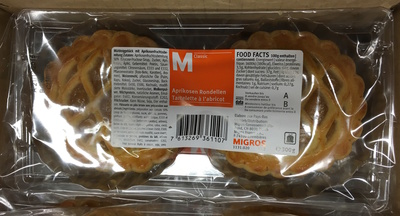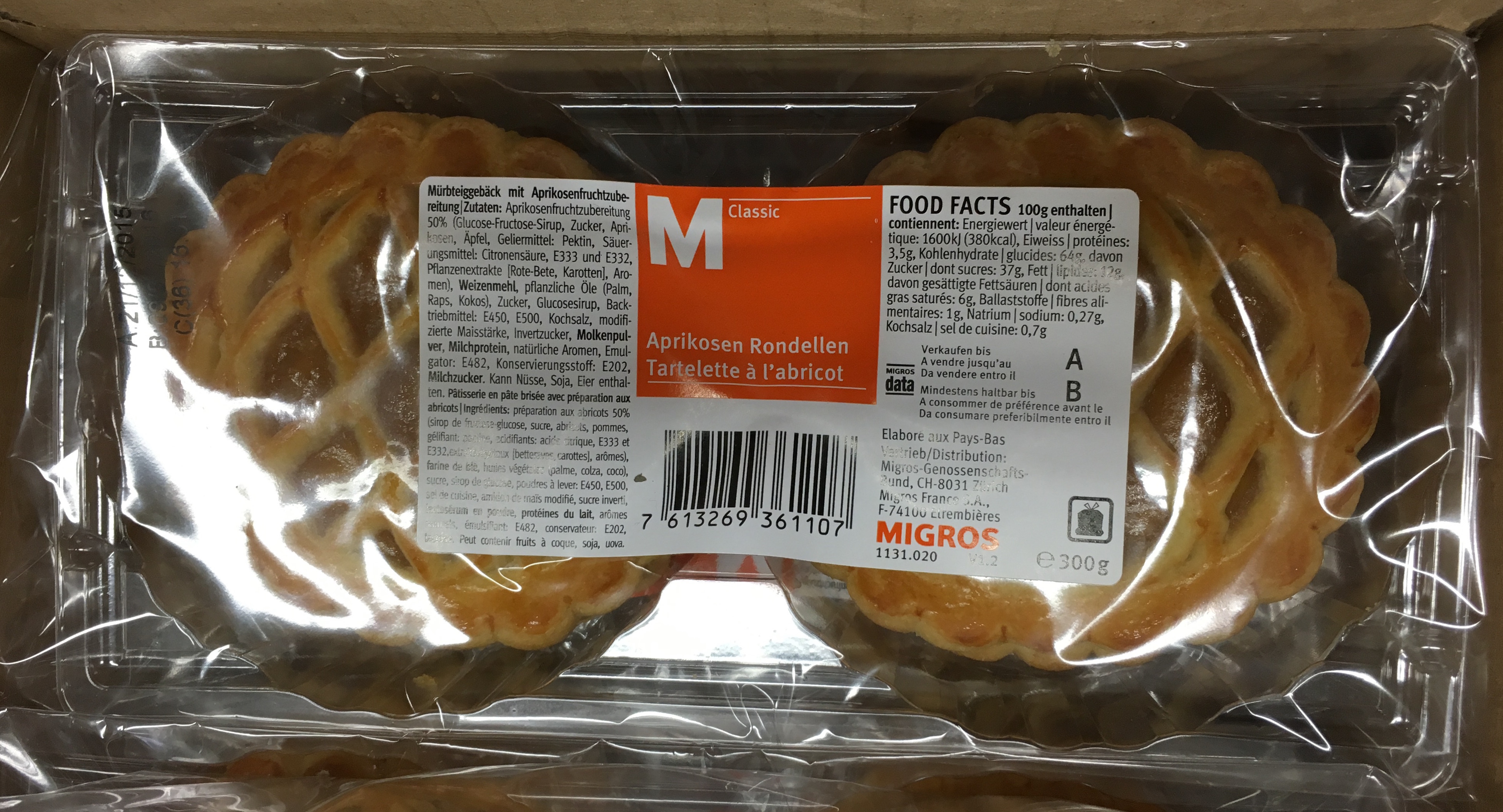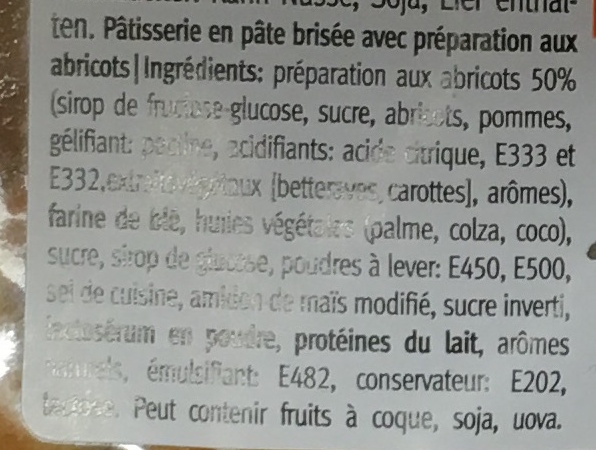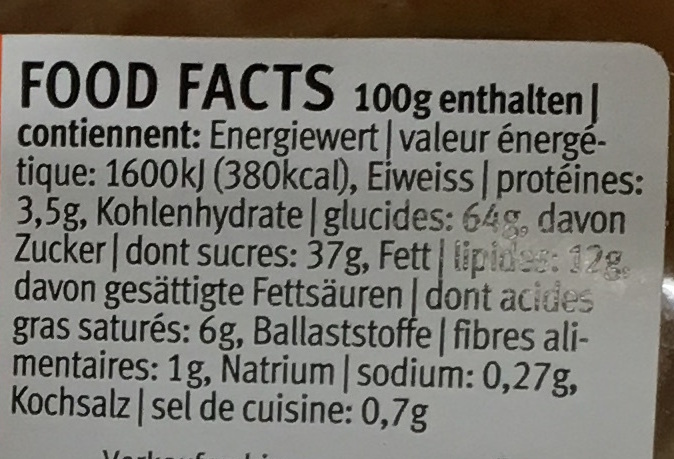Help us make food transparency the norm!
As a non-profit organization, we depend on your donations to continue informing consumers around the world about what they eat.
The food revolution starts with you!
Tartelettes à l'abricot - Migros - 300 g
Tartelettes à l'abricot - Migros - 300 g
This product page is not complete. You can help to complete it by editing it and adding more data from the photos we have, or by taking more photos using the app for Android or iPhone/iPad. Thank you!
×
Barcode: 7613269361107 (EAN / EAN-13)
Common name: Pâtisserie en pâte brisée avec préparation aux abricots
Quantity: 300 g
Brands: Migros
Categories: Snacks, Sweet snacks, Biscuits and cakes, Biscuits, Sweet pies, Pies, Tartlets, Fruit tartlets, Apricot tartlets, Tartlet biscuits with fruit preparation
Manufacturing or processing places: Pays-Bas
Stores: Migros
Countries where sold: Switzerland
Matching with your preferences
Health
Ingredients
-
35 ingredients
: préparation aux abricots 50% (sirop de fructose-glucose, sucre, abricots, pommes, gélifiant : pectine, acidifiant : acide citrique, E333 et E332, extrait de végétaux [betterave, carottes], arômes), farine de blé, huiles végétales (palme, colza, coco), sucre, sirop de glucose, poudres à lever : E450, E500, sel de cuisine, amidon de maïs modifié, sucre inverti, lactosérum en poudre, protéines du lait, arômes naturels, émulsifiant : E482, conservateur : E202, lactose.Allergens: Gluten, MilkTraces: Eggs, Nuts, Soybeans
Food processing
-
Ultra processed foods
Elements that indicate the product is in the 4 - Ultra processed food and drink products group:
- Additive: E440 - Pectins
- Additive: E450 - Diphosphates
- Additive: E482 - Calcium stearoyl-2-lactylate
- Ingredient: Emulsifier
- Ingredient: Flavouring
- Ingredient: Gelling agent
- Ingredient: Glucose
- Ingredient: Glucose syrup
- Ingredient: Invert sugar
- Ingredient: Lactose
- Ingredient: Milk proteins
- Ingredient: Whey
Food products are classified into 4 groups according to their degree of processing:
- Unprocessed or minimally processed foods
- Processed culinary ingredients
- Processed foods
- Ultra processed foods
The determination of the group is based on the category of the product and on the ingredients it contains.
Additives
-
E202 - Potassium sorbate
Potassium sorbate (E202) is a synthetic food preservative commonly used to extend the shelf life of various food products.
It works by inhibiting the growth of molds, yeast, and some bacteria, preventing spoilage. When added to foods, it helps maintain their freshness and quality.
Some studies have shown that when combined with nitrites, potassium sorbate have genotoxic activity in vitro. However, potassium sorbate is generally recognized as safe (GRAS) by regulatory authorities.
-
E330 - Citric acid
Citric acid is a natural organic acid found in citrus fruits such as lemons, oranges, and limes.
It is widely used in the food industry as a flavor enhancer, acidulant, and preservative due to its tart and refreshing taste.
Citric acid is safe for consumption when used in moderation and is considered a generally recognized as safe (GRAS) food additive by regulatory agencies worldwide.
-
E332 - Potassium citrates
Potassium citrate: Potassium citrate -also known as tripotassium citrate- is a potassium salt of citric acid with the molecular formula K3C6H5O7. It is a white, hygroscopic crystalline powder. It is odorless with a saline taste. It contains 38.28% potassium by mass. In the monohydrate form it is highly hygroscopic and deliquescent. As a food additive, potassium citrate is used to regulate acidity and is known as E number E332. Medicinally, it may be used to control kidney stones derived from either uric acid or cystine.Source: Wikipedia
-
E333 - Calcium citrates
Calcium citrate: Calcium citrate is the calcium salt of citric acid. It is commonly used as a food additive -E333-, usually as a preservative, but sometimes for flavor. In this sense, it is similar to sodium citrate. Calcium citrate is also found in some dietary calcium supplements -e.g. Citracal-. Calcium makes up 24.1% of calcium citrate -anhydrous- and 21.1% of calcium citrate -tetrahydrate- by mass. The tetrahydrate occurs in nature as the mineral Earlandite.Source: Wikipedia
-
E440 - Pectins
Pectins (E440) are natural carbohydrates, predominantly found in fruits, that act as gelling agents in the food industry, creating the desirable jelly-like texture in jams, jellies, and marmalades.
Pectins stabilize and thicken various food products, such as desserts, confectioneries, and beverages, ensuring a uniform consistency and quality.
Recognized as safe by various health authorities, pectins have been widely used without notable adverse effects when consumed in typical dietary amounts.
-
E450 - Diphosphates
Diphosphates (E450) are food additives often utilized to modify the texture of products, acting as leavening agents in baking and preventing the coagulation of canned food.
These salts can stabilize whipped cream and are also found in powdered products to maintain their flow properties. They are commonly present in baked goods, processed meats, and soft drinks.
Derived from phosphoric acid, they're part of our daily phosphate intake, which often surpasses recommended levels due to the prevalence of phosphates in processed foods and drinks.
Excessive phosphate consumption is linked to health issues, such as impaired kidney function and weakened bone health. Though diphosphates are generally regarded as safe when consumed within established acceptable daily intakes, it's imperative to monitor overall phosphate consumption to maintain optimal health.
-
E482 - Calcium stearoyl-2-lactylate
Calcium stearoyl-2-lactylate: Calcium stearoyl-2-lactylate -calcium stearoyl lactylate or CSL- or E482 is a versatile, FDA approved food additive. It is one type of a commercially available lactylate. CSL is non-toxic, biodegradable, and typically manufactured using biorenewable feedstocks. Because CSL is a safe and highly effective food additive, it is used in a wide variety of products from baked goods and desserts to packaging.As described by the Food Chemicals Codex 7th edition, CSL is a cream-colored powder. CSL is currently manufactured by the esterification of stearic acid and lactic acid with partial neutralization using food-grade hydrated lime -calcium hydroxide-. Commercial grade CSL is a mixture of calcium salts of stearoyl lactic acid, with minor proportions of other salts of related acids. The HLB for CSL is 5.1. It is slightly soluble in hot water. The pH of a 2% aqueous suspension is approximately 4.7.Source: Wikipedia
-
E500 - Sodium carbonates
Sodium carbonates (E500) are compounds commonly used in food preparation as leavening agents, helping baked goods rise by releasing carbon dioxide when they interact with acids.
Often found in baking soda, they regulate the pH of food, preventing it from becoming too acidic or too alkaline. In the culinary world, sodium carbonates can also enhance the texture and structure of foods, such as noodles, by modifying the gluten network.
Generally recognized as safe, sodium carbonates are non-toxic when consumed in typical amounts found in food.
Ingredients analysis
-
Palm oil
Ingredients that contain palm oil: Palm oil
-
Non-vegan
Non-vegan ingredients: Whey powder, Milk proteins, LactoseSome ingredients could not be recognized.
We need your help!
You can help us recognize more ingredients and better analyze the list of ingredients for this product and others:
- Edit this product page to correct spelling mistakes in the ingredients list, and/or to remove ingredients in other languages and sentences that are not related to the ingredients.
- Add new entries, synonyms or translations to our multilingual lists of ingredients, ingredient processing methods, and labels.
If you would like to help, join the #ingredients channel on our Slack discussion space and/or learn about ingredients analysis on our wiki. Thank you!
-
Vegetarian status unknown
Unrecognized ingredients: fr:preparation-aux-abricots, Invert sugarSome ingredients could not be recognized.
We need your help!
You can help us recognize more ingredients and better analyze the list of ingredients for this product and others:
- Edit this product page to correct spelling mistakes in the ingredients list, and/or to remove ingredients in other languages and sentences that are not related to the ingredients.
- Add new entries, synonyms or translations to our multilingual lists of ingredients, ingredient processing methods, and labels.
If you would like to help, join the #ingredients channel on our Slack discussion space and/or learn about ingredients analysis on our wiki. Thank you!
-
Details of the analysis of the ingredients
We need your help!
Some ingredients could not be recognized.
We need your help!
You can help us recognize more ingredients and better analyze the list of ingredients for this product and others:
- Edit this product page to correct spelling mistakes in the ingredients list, and/or to remove ingredients in other languages and sentences that are not related to the ingredients.
- Add new entries, synonyms or translations to our multilingual lists of ingredients, ingredient processing methods, and labels.
If you would like to help, join the #ingredients channel on our Slack discussion space and/or learn about ingredients analysis on our wiki. Thank you!
: préparation aux abricots 50% (sirop de fructose-glucose, sucre, abricots, pommes, gélifiant (pectine), acidifiant (acide citrique), e333, e332, extrait (betterave, carottes), arômes), farine de _blé_, huiles végétales de palme, huiles végétales de colza, huiles végétales de coco, sucre, sirop de glucose, poudres à lever (e450), e500, sel de cuisine, amidon de maïs modifié, sucre inverti, _lactosérum_ en poudre, protéines du _lait_, arômes naturels, émulsifiant (e482), conservateur (e202), _lactose_- préparation aux abricots -> fr:preparation-aux-abricots - percent_min: 50 - percent: 50 - percent_max: 50
- sirop de fructose-glucose -> en:glucose-fructose-syrup - vegan: yes - vegetarian: yes - ciqual_food_code: 31077 - percent_min: 5 - percent_max: 50
- sucre -> en:sugar - vegan: yes - vegetarian: yes - ciqual_proxy_food_code: 31016 - percent_min: 0 - percent_max: 25
- abricots -> en:apricot - vegan: yes - vegetarian: yes - ciqual_food_code: 13000 - percent_min: 0 - percent_max: 16.6666666666667
- pommes -> en:apple - vegan: yes - vegetarian: yes - ciqual_food_code: 13050 - percent_min: 0 - percent_max: 12.5
- gélifiant -> en:gelling-agent - percent_min: 0 - percent_max: 10
- pectine -> en:e440a - vegan: yes - vegetarian: yes - percent_min: 0 - percent_max: 10
- acidifiant -> en:acid - percent_min: 0 - percent_max: 8.33333333333333
- acide citrique -> en:e330 - vegan: yes - vegetarian: yes - percent_min: 0 - percent_max: 8.33333333333333
- e333 -> en:e333 - vegan: yes - vegetarian: yes - percent_min: 0 - percent_max: 7.14285714285714
- e332 -> en:e332 - vegan: yes - vegetarian: yes - percent_min: 0 - percent_max: 6.25
- extrait -> en:extract - labels: en:vegan - vegan: en:yes - vegetarian: en:yes - percent_min: 0 - percent_max: 5.55555555555556
- betterave -> en:beetroot - vegan: yes - vegetarian: yes - ciqual_proxy_food_code: 20091 - percent_min: 0 - percent_max: 5.55555555555556
- carottes -> en:carrot - vegan: yes - vegetarian: yes - ciqual_food_code: 20009 - percent_min: 0 - percent_max: 2.77777777777778
- arômes -> en:flavouring - vegan: maybe - vegetarian: maybe - percent_min: 0 - percent_max: 5
- farine de _blé_ -> en:wheat-flour - vegan: yes - vegetarian: yes - ciqual_proxy_food_code: 9410 - percent_min: 2.94117647058824 - percent_max: 50
- huiles végétales de palme -> en:palm-oil - vegan: yes - vegetarian: yes - from_palm_oil: yes - ciqual_food_code: 16129 - percent_min: 0 - percent_max: 33.3333333333333
- huiles végétales de colza -> en:colza-oil - vegan: yes - vegetarian: yes - from_palm_oil: no - ciqual_food_code: 17130 - percent_min: 0 - percent_max: 23.5294117647059
- huiles végétales de coco -> en:coconut-oil - vegan: yes - vegetarian: yes - from_palm_oil: no - ciqual_food_code: 16040 - percent_min: 0 - percent_max: 15.6862745098039
- sucre -> en:sugar - vegan: yes - vegetarian: yes - ciqual_proxy_food_code: 31016 - percent_min: 0 - percent_max: 11.7647058823529
- sirop de glucose -> en:glucose-syrup - vegan: yes - vegetarian: yes - ciqual_proxy_food_code: 31016 - percent_min: 0 - percent_max: 9.41176470588235
- poudres à lever -> en:raising-agent - percent_min: 0 - percent_max: 7.84313725490196
- e450 -> en:e450 - vegan: yes - vegetarian: yes - percent_min: 0 - percent_max: 7.84313725490196
- e500 -> en:e500 - vegan: yes - vegetarian: yes - percent_min: 0 - percent_max: 6.72268907563025
- sel de cuisine -> en:salt - vegan: yes - vegetarian: yes - ciqual_food_code: 11058 - percent_min: 0 - percent_max: 0.7
- amidon de maïs modifié -> en:modified-corn-starch - vegan: yes - vegetarian: yes - ciqual_food_code: 9510 - percent_min: 0 - percent_max: 0.7
- sucre inverti -> en:invert-sugar - percent_min: 0 - percent_max: 0.7
- _lactosérum_ en poudre -> en:whey-powder - vegan: no - vegetarian: maybe - percent_min: 0 - percent_max: 0.7
- protéines du _lait_ -> en:milk-proteins - vegan: no - vegetarian: yes - percent_min: 0 - percent_max: 0.7
- arômes naturels -> en:natural-flavouring - vegan: maybe - vegetarian: maybe - percent_min: 0 - percent_max: 0.7
- émulsifiant -> en:emulsifier - percent_min: 0 - percent_max: 0.7
- e482 -> en:e482 - vegan: maybe - vegetarian: maybe - from_palm_oil: maybe - percent_min: 0 - percent_max: 0.7
- conservateur -> en:preservative - percent_min: 0 - percent_max: 0.7
- e202 -> en:e202 - vegan: yes - vegetarian: yes - percent_min: 0 - percent_max: 0.7
- _lactose_ -> en:lactose - vegan: no - vegetarian: yes - percent_min: 0 - percent_max: 0.7
Nutrition
-
Bad nutritional quality
⚠ ️Warning: the amount of fruits, vegetables and nuts is not specified on the label, it was estimated from the list of ingredients: 14This product is not considered a beverage for the calculation of the Nutri-Score.
Positive points: 1
- Proteins: 2 / 5 (value: 3.5, rounded value: 3.5)
- Fiber: 1 / 5 (value: 1, rounded value: 1)
- Fruits, vegetables, nuts, and colza/walnut/olive oils: 0 / 5 (value: 14.4077435661765, rounded value: 14.4)
Negative points: 20
- Energy: 4 / 10 (value: 1600, rounded value: 1600)
- Sugars: 8 / 10 (value: 37, rounded value: 37)
- Saturated fat: 5 / 10 (value: 6, rounded value: 6)
- Sodium: 3 / 10 (value: 280, rounded value: 280)
The points for proteins are not counted because the negative points are greater or equal to 11.
Nutritional score: (20 - 1)
Nutri-Score:
-
Nutrient levels
-
Fat in moderate quantity (12%)
What you need to know- A high consumption of fat, especially saturated fats, can raise cholesterol, which increases the risk of heart diseases.
Recommendation: Limit the consumption of fat and saturated fat- Choose products with lower fat and saturated fat content.
-
Saturated fat in high quantity (6%)
What you need to know- A high consumption of fat, especially saturated fats, can raise cholesterol, which increases the risk of heart diseases.
Recommendation: Limit the consumption of fat and saturated fat- Choose products with lower fat and saturated fat content.
-
Sugars in high quantity (37%)
What you need to know- A high consumption of sugar can cause weight gain and tooth decay. It also augments the risk of type 2 diabetes and cardio-vascular diseases.
Recommendation: Limit the consumption of sugar and sugary drinks- Sugary drinks (such as sodas, fruit beverages, and fruit juices and nectars) should be limited as much as possible (no more than 1 glass a day).
- Choose products with lower sugar content and reduce the consumption of products with added sugars.
-
Salt in moderate quantity (0.7%)
What you need to know- A high consumption of salt (or sodium) can cause raised blood pressure, which can increase the risk of heart disease and stroke.
- Many people who have high blood pressure do not know it, as there are often no symptoms.
- Most people consume too much salt (on average 9 to 12 grams per day), around twice the recommended maximum level of intake.
Recommendation: Limit the consumption of salt and salted food- Reduce the quantity of salt used when cooking, and don't salt again at the table.
- Limit the consumption of salty snacks and choose products with lower salt content.
-
-
Nutrition facts
Nutrition facts As sold
for 100 g / 100 mlCompared to: Apricot tartlets Energy 1,600 kj
(382 kcal)+10% Fat 12 g -7% Saturated fat 6 g +5% Carbohydrates 64 g +29% Sugars 37 g +49% Fiber 1 g -38% Proteins 3.5 g -12% Salt 0.7 g +139% Fruits‚ vegetables‚ nuts and rapeseed‚ walnut and olive oils (estimate from ingredients list analysis) 14.408 %
Environment
-
Eco-Score C - Moderate environmental impact
⚠ ️Select a country in order to include the full impact of transportation.The Eco-Score is an experimental score that summarizes the environmental impacts of food products.→ The Eco-Score was initially developped for France and it is being extended to other European countries. The Eco-Score formula is subject to change as it is regularly improved to make it more precise and better suited to each country.Life cycle analysis
-
Average impact of products of the same category: B (Score: 75/100)
Category: Biscuit (small tart), with fruit covering
Category: Biscuit (small tart), with fruit covering
- PEF environmental score: 0.31 (the lower the score, the lower the impact)
- including impact on climate change: 2.29 kg CO2 eq/kg of product
Stage Impact Agriculture
77.4 %Processing
13.1 %Packaging
3.5 %Transportation
4.5 %Distribution
1.5 %Consumption
0.0 %
Bonuses and maluses
-
Missing origins of ingredients information
Malus: -5
⚠ ️ The origins of the ingredients of this product are not indicated.
If they are indicated on the packaging, you can modify the product sheet and add them.
If you are the manufacturer of this product, you can send us the information with our free platform for producers.
-
Ingredients that threatens species
Malus: -10
Contains palm oil
Tropical forests in Asia, Africa and Latin America are destroyed to create and expand oil palm tree plantations. The deforestation contributes to climate change, and it endangers species such as the orangutan, the pigmy elephant and the Sumatran rhino.
-
Packaging with a high impact
Malus: -15
Shape Material Recycling Impact Tray Plastic High Bag Unknown High ⚠ ️ The information about the packaging of this product is not sufficiently precise (exact shapes and materials of all components of the packaging).⚠ ️ For a more precise calculation of the Eco-Score, you can modify the product page and add them.
If you are the manufacturer of this product, you can send us the information with our free platform for producers.
Eco-Score for this product
-
Impact for this product: C (Score: 45/100)
Product: Tartelettes à l'abricot - Migros - 300 g
Life cycle analysis score: 75
Sum of bonuses and maluses: -30
Final score: 45/100
-
Carbon footprint
-
Equal to driving 1.2 km in a petrol car
229 g CO² per 100g of product
The carbon emission figure comes from ADEME's Agribalyse database, for the category: Biscuit (small tart), with fruit covering (Source: ADEME Agribalyse Database)
Stage Impact Agriculture
76.7 %Processing
10.3 %Packaging
4.8 %Transportation
7.4 %Distribution
0.9 %Consumption
0.0 %
Packaging
-
Packaging with a high impact
-
Packaging parts
Tray (Plastic)
Bag
-
Packaging materials
Material % Packaging weight Packaging weight per 100 g of product Plastic
-
Transportation
-
Origins of ingredients
Missing origins of ingredients information
⚠ ️ The origins of the ingredients of this product are not indicated.
If they are indicated on the packaging, you can modify the product sheet and add them.
If you are the manufacturer of this product, you can send us the information with our free platform for producers.Add the origins of ingredients for this product Add the origins of ingredients for this product
Threatened species
-
Contains palm oil
Drives deforestation and threatens species such as the orangutan
Tropical forests in Asia, Africa and Latin America are destroyed to create and expand oil palm tree plantations. The deforestation contributes to climate change, and it endangers species such as the orangutan, the pigmy elephant and the Sumatran rhino.
Report a problem
-
Incomplete or incorrect information?
Category, labels, ingredients, allergens, nutritional information, photos etc.
If the information does not match the information on the packaging, please complete or correct it. Open Food Facts is a collaborative database, and every contribution is useful for all.
Data sources
Product added on by tacite
Last edit of product page on by packbot.
Product page also edited by openfoodfacts-contributors, segundo, tacite-mass-editor, teolemon.










